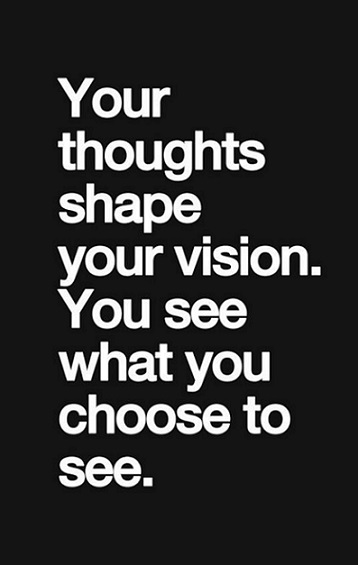Inspiration
Your Thoughts Shape Your Vision: You See What You Choose to See

Our perception of the world is not just a passive reception of reality, it is an active construction shaped by our thoughts, beliefs, and expectations.
The saying, "You see what you choose to see," highlights how our mindset influences our experiences, decisions, and even our reality.
The Power of Perception
Perception is subjective. Two people can witness the same event yet interpret it differently based on their mental filters. These filters include:
- Beliefs – What you accept as true shapes how you process information.
- Attitude – Optimists see opportunities; pessimists see obstacles.
- Past experiences – Previous events influence how you view new ones.
- Focus – What you pay attention to becomes your reality.
Example 1: The Half-Filled Glass
- An optimist sees a glass as half-full, focusing on abundance.
- A pessimist sees it as half-empty, focusing on lack.
- The glass hasn’t changed—only the perception has.
Example 2: Challenges vs. Opportunities
- Entrepreneur A sees a market downturn as a chance to innovate.
- Entrepreneur B sees the same downturn as a reason to quit.
Their thoughts shape their next steps—one grows, the other gives up.
How Your Vision Creates Your Reality
Cognitive psychology and the "self-fulfilling prophecy" concept show that expectations influence outcomes. If you believe you’ll fail, you might unconsciously sabotage yourself. If you believe in success, you take actions that align with that belief.
Example 3: Job Interviews
- Candidate A thinks, "I’m not good enough," and performs nervously.
- Candidate B thinks, "I’m prepared and capable," and exudes confidence.
The interviewer responds to their energy—one gets rejected, the other hired.
Training Your Mind to See Differently
You can reshape your vision by consciously directing your thoughts:
1. Practice Gratitude – Focus on what’s working rather than what’s missing.
2. Reframe Negatives – Ask: "What can I learn from this?" instead of "Why does this always happen to me?"
3. Visualize Success – Your brain starts recognizing opportunities aligned with your vision.
4. Limit Negative Inputs – News, toxic people, and self-doubt reinforce a negative worldview.
Example 4: The Street Performer
- Some see a struggling artist; others see a passionate soul sharing talent.
- The performer remains the same—the observer’s mindset defines the interpretation.
Final Thought: You Choose Your Lens
Reality is not fixed; it’s a reflection of your inner world. By shifting your thoughts, you change what you see—and ultimately, what you experience.
"The world is but a canvas to our imagination." — Henry David Thoreau

Do You Owe A Debt Of Thanks?
Inspiration:The time of year is upon us when many individuals take stock of all that they are grateful for -- or at least when we should do so. But this should also be a time when we take stock of all those people who contributed to those gifts, especially the intangible ones. Those gifts such as our self-esteem or confidence, our love of sports or music, and our spine. What person or group do you owe the greatest debt? Was there a special person or group that really helped you become the person you are today? Was there someone who helped you believe in yourself and your ability? Was there someone who taught you to appreciate life in a new way? Was there just someone who was there so you could count on them no matter what?
Most of us have been fortunate to have not just one person but a whole team of friends, teachers, coaches, and mentors who helped us grow and reach our potential. We should remember to thank those people again and again as we live the lives they helped us shape. Even more important we need to repay that debt, not to those individuals but to society.
How is your debt? Have you paid it yet or are you still pretending it doesn't exist?We often hear the expression as it relates to criminals. It is sometimes used as a euphemism for incarceration. The truth is though that we all owe a debt to society. Not because we have done some harm to the community but instead because we have benefited from someone else doing good.
We Are Helping 1000 Businesses Amplify Their Online Presence
The Lord's Prayer includes the phrase "And forgive us our debts as we forgive our debtors". Obviously no matter how good we are and how exemplary our lives we can never repay our debt to God or his son so that part of the meaning is rather clear.
I also think this means that we should do good for goodness sake rather than any potential benefit we may reap from the act. I believe there is another level of meaning and this comes back to the central idea of our debt to society. I think when it comes down to acts of kindness there cannot be a one-to-one relationship. Obviously in many cases when a person is in need of help they may never be in a position to return that help in kind. But it isn't really what we want or need when we offer help or kindness in any case.

Whenever I do something charitable, helpful, or kind, I tend to view the act as contributing to a vast fund of kindness. Many times in my life I have profited from this fund and very likely I will continue to profit from it. One of the reasons I like this concept is that I do think of it as a sort of fund or bank. The value grows exponentially rather than incrementally just as money would do if similarly invested. We should all be grateful for this because the truth is that we usually don't pay our debt to society. Most of us will write the occasional check, buy a ticket for some raffle, and/or spend a few hours working here and there on some pet project. There are a few who will go much further than this and spend a large portion of their time, energy, and/or money for the greater good but they are far too few.
Often whenever we face pressure on our time or finances then it is our philanthropic activities that are the first to be sacrificed. I have been all too guilty of this myself. I wonder what would happen if we reversed this and instead put helping others first rather than last?
My challenge to you this week is simply to find a way to add to our goodness fund. Borrow from the concept of "Pay It Forward". When someone offers you a helping hand then be sure to pass the favor along at the first opportunity. Don't pick and choose. Don't balance your checkbook first. Don't take the easy path. Do what is right. You will know it when you see it.
Beauty,Gratitude,And The Open Heart
Your Thoughts And The Law Of Attraction
Give YourSelf Permission To Love
Positive Attitude And Our Outlook On Life
InternetBusinessIdeas-Viralmarketing Homepage
Tweet
Follow @Charlesfrize









